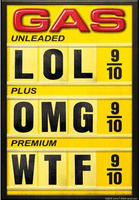Wrong. Yep, I was wrong, wrong as wrong can be. Evidently Doodoo Economics (http://guambatstew.blogspot.com/2005/09/doodoo-economics.html) is  good, orthodox economics. I don't remember it from my own econ 101 course taken over 30 years ago, but it doesn't seem to be arguable: Price gouging IS good for you.
good, orthodox economics. I don't remember it from my own econ 101 course taken over 30 years ago, but it doesn't seem to be arguable: Price gouging IS good for you.
If only I had taken time to google the subject before I went off all half-cocked and all, I'd have saved myself the terrible embarrassment of this contrite backdown. And evidently, the folks over there in econland are somewhat tetchy about it, too. Why, all you need is the hint of some natural disaster on the horizon and they all start clucking because they know they're going to take a licking from do-gooder or buck-passing politicians, and soft-headed liberals, and, and, well, and all them other folks what just hain't got a proper education.
Yep, that's me.
 Come Katrina and they are all on Red Alert. Those folks over at the Ludwig von Mises Institute (http://blog.mises.org/blog/archives/004022.asp) even graciously produced a "Price Gouging Reader" with such heart warming themes as
Come Katrina and they are all on Red Alert. Those folks over at the Ludwig von Mises Institute (http://blog.mises.org/blog/archives/004022.asp) even graciously produced a "Price Gouging Reader" with such heart warming themes as "
Price Gouging Saves Lives". (
Geeze, I'm sorry, Jack.) And as snide as I am making this sound, I kid you not, this is well respected and highly followed thinking. And as I said, just google "price gouging" and get "In praise of price gouging"
http://www.janegalt.net/blog/archives/005435.html , "
Let 'em gouge"
http://www.cato.org/research/articles/vandoren-030401.html , "Three Cheers for Price Gougers"
http://www.techcentralstation.com/0902055.html and on and on.One of the professors whose work I cited in "Doodoo Economics" emailed me: "Here are some delightful effects [which] occur when people refuse to "gouge."
http://www.marginalrevolution.com/marginalrevolution/2005/08/no_such_thing_a.html Heaven knows I wouldn't want any part of causing a stampede to buy cheap computers from a guy who forgot to price gouge.
 So, well, I've learned the error of my ways. Instead of Doodoo
So, well, I've learned the error of my ways. Instead of Doodoo Economics, I'll just lie back and think of England next time I'm price gouged. Dreaming of happy little dancing Corgis, all doing their best for the greater economic good.But, I think I might have also put my finger on the error of their ways. As I responded to that last email:
Economics, I'll just lie back and think of England next time I'm price gouged. Dreaming of happy little dancing Corgis, all doing their best for the greater economic good.But, I think I might have also put my finger on the error of their ways. As I responded to that last email:"Sir, I really do appreciate that you have taken the time to even consider let alone respond to my spew. I didn't actually expect it, sending you a link to my post out of courtesy, and because I was unable to respond to your post on your blog.
So, we are in agreement, then, that monopolies are a good thing and should be encouraged. We should scrap the anti-trust laws and refrain from any attempt to intervene in monopoly formation and maintenance and the delightful effects of them. Right?
If, if, I could put a finger on it, my core problem with your position (which I acknowledge may be widely if not universally held amongst economists), is that it is so absolutist. It seems to be an article of unswerving faith that in every instance, no matter how dire or extreme, it is the weight of money that will in every case trump the weight of need, and any attempt to intervene on behalf of need is dead-set wrong.
Einstein taught us that even the "laws" of physics are relative. We are social animals, and to say, as your model does, that social consideration has no place in the scheme of things is to me a great heresy. I am not a Christian, I have no articulable belief in a deity, I invest and chase after market gains, but I also feel in every fibre of my being that money must not always be the final arbiter of good social policy or judgement.
And I admit to not having, off the cuff, a policy response to "gouging" in mind. I accept that Nixon's wage and price controls may have had more adverse economic impact than benefit (though I am not a student of socio-economics [can I use that description?] and have not ever rigorously examined the question).
Nevertheless, when you speak of "gouging" you are implying an unfairness that is just culturally wrong. I believe that we must allow for some form of intervention in some circumstances, notwithstanding the distortions to the prettiness of your construct.
I am sure that we would find much more agreement if we had some common understanding of what is a "reasonable" price rise; but "gouging" is categorically different, as different as accidental death and murder.
I don't suppose that accidental death and murder are distinguishable in economic theory: a death is a death. But it is society's right to draw a moral distinction and to declare one as reprehensible and punishable, and one not.
I sincerely thank you for your patience. It must be trying, dealing with the unwashed."
I'll let you know his response. He's not a bad person, you know. He is in  exalted company, and deservedly so. And I read his blog regularly, because he's a fair teacher. He just goes some places I daren't tread.
exalted company, and deservedly so. And I read his blog regularly, because he's a fair teacher. He just goes some places I daren't tread.Labels: Uber free markets
 good, orthodox economics. I don't remember it from my own econ 101 course taken over 30 years ago, but it doesn't seem to be arguable: Price gouging IS good for you.
good, orthodox economics. I don't remember it from my own econ 101 course taken over 30 years ago, but it doesn't seem to be arguable: Price gouging IS good for you.

 Economics, I'll just lie back and think of England next time I'm price gouged. Dreaming of happy little dancing Corgis, all doing their best for the greater economic good.
Economics, I'll just lie back and think of England next time I'm price gouged. Dreaming of happy little dancing Corgis, all doing their best for the greater economic good. exalted company, and deservedly so. And I read his blog regularly, because he's a fair teacher. He just goes some places I daren't tread.
exalted company, and deservedly so. And I read his blog regularly, because he's a fair teacher. He just goes some places I daren't tread.
0 Comments:
Post a Comment
<< Home